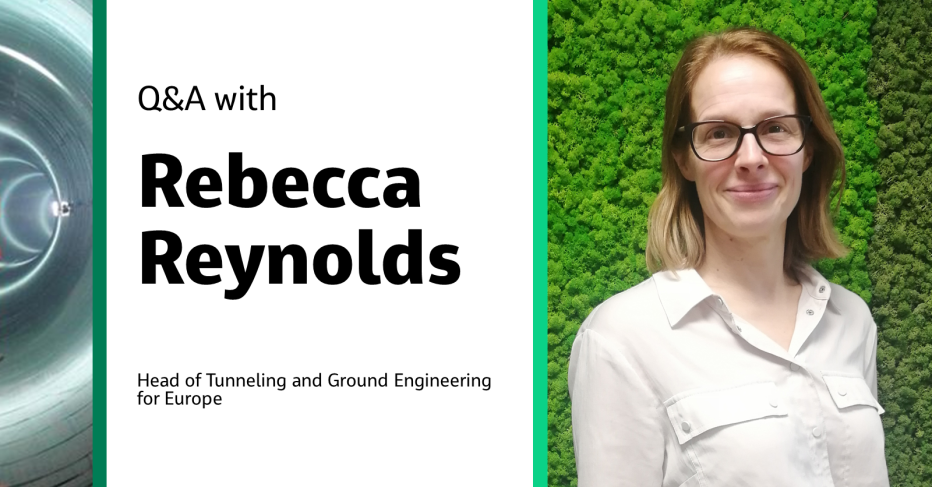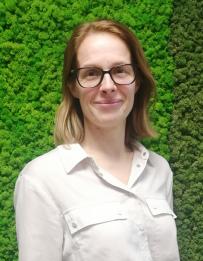
Tunneling and ground engineering are often underappreciated engineering feats. Unlike skyscrapers and bridges, the vast work in these areas is hidden and underfoot; as a result, most people are unaware of the sheer scale and ingenuity required.
Jacobs is proud to have created numerous tunneling and ground engineering projects that have world-renowned legacies and are sustainable, carbon-conscious role models. From the U.K.’s Thames Tideway Tunnel to California High Speed Rail in the U.S., our teams are at the forefront of this groundbreaking engineering.
Rebecca Reynolds is one of the inspirational leaders of these teams. In this article, Rebecca describes how she uses collaboration, cross-sector learning and technology to pioneer the tunnel and ground engineering movement.
Hi Rebecca, please tell us about your career to date.
My career before Jacobs was a mix of consultancy and contracting work over 20 years, the majority focusing on technical work within smaller consultancies which helped me experience all sides of project work. I've worked all over the world, including in the Middle East and Asia, with an extended stint in Hong Kong.
I've now been with Jacobs for over seven years, and I’ve worked in various technical and leadership roles, including sector, market and technical lead. This led to the opportunity for my current position, which I’ve held for four years. I lead tunneling and ground engineering (TGE) in Europe within our water and environment business. It comprises of 350 staff members across the U.K. and Ireland — 100 tunnellers and 250 ground engineers, including geologists and civil engineers. I’m responsible for strategic growth, daily operations, meeting margins, billable hours and recruitment. I'm also the European lead for market solutions, which allows me to collaborate closely with the fantastic TGE employees based in our Global Design Center in Poland.
The TGE team sits across sectors and services all markets and a huge range of clients in Jacobs. We work closely with the global team, which numbers around 850 people, and constantly share insights, resources and talent for bigger strategic opportunities. We can leverage our specialists from anywhere globally to ensure we offer the best service.
How are you helping to solve our clients’ biggest challenges?
Every sector has slightly different opportunities, but one that underpins them all would be the constant drive towards digital innovation and offering greater digital efficiency to our clients to improve outcomes, including decarbonization and sustainability. Our Head of Geodigital, David Wright, has been researching and implementing initiatives in automated design, 4D modeling and advanced visualizations.
Previously, we relied on paper drawings, and explaining complex projects in 2D to clients was challenging. Now, we have these fantastic 4D visualization facilities, which help the client understand the details and challenges behind the major schemes we’re trying to build. Considering the size of the giga projects we’re involved in, you can understand the benefit of visualizing the scale and empowering more sustainable design decisions.
Within our industry, we’re similar in size and service to competitors, but our culture of trust and safety and how we operate separates us. We believe that helps make clients want to work with us. We have closely integrated, cross-sector teams filled with highly talented people — there are no silos or sacred hierarchies. Our employees get to work on the best projects, no matter where they’re based, and everyone has a voice.
We also stay ahead in our technical offering by partnering with subject matter experts. We have a lot of interaction with local academia and universities, and we sponsor research and in-house PhD work. Thanks to having these academics and professors based in our teams, we're at the forefront of technical innovation. For example, we’re working with Strathclyde University to set up a new seismic database for the U.K. Once we’ve done that, we'll be the only people who can do that type of work because we'll have written the book on the subject. This academic link is critical to how we work; it keeps us on the sharp edge of innovation.
How are you incorporating decarbonization in all your solutions?
It starts by making every project a climate resilient project. One of our recent success stories was on a deep shaft on a major rail program. Our designers used our pioneering research-backed design principles — known as de5ign — which outline a behavioral sustainable design management process, right from the beginning in a collaborative effort with the partners. We made substantial carbon savings by reducing the shaft design and the walls' thickness.
Another example is our earthworks on Lower Thames Crossing (LTC). Also called mass haul, it’s an underappreciated part of these programs, especially in sustainability, as we’ve found that up to 30% of a project’s carbon cost can be based on the earthworks. Taking this soil offsite or moving it around can also cause significant biodiversity issues as you cover up large areas.
For LTC, we stepped back and reworked the earthworks plan to reduce carbon emissions. Based on this step-back approach, part of it looked at where we could move material onsite (instead of offsite) and use local materials. The reduction in carbon emissions provided by these measures has been calculated at 61,000 tons of carbon dioxide equivalent (55,000 tonnes), which is the equal to the carbon required to power 57,000 homes for a year. We’re now applying all these learnings, including our circular economy capabilities, in current and future projects globally.
How do you drive collaboration in cross-sector projects?
The key is having constant conversations — part of my role is making connections. For example, I help bridge the gap between the extraordinary work being done in the water sector so it can be applied to the transportation sector. Having the right technical people speaking to operations and sales is crucial. Roles change constantly, so this is an ongoing process.
To further drive the cross-fertilization of knowledge across our global teams, we have several communities of practice across the tunneling, ground engineering and geotechnical fields and regular team calls and meetings at local levels. We also do a lunch and learn series featuring internal and external speakers and save it all on a channel called GEOTUBE, our online learning system, and our learning and development library. It has become an invaluable resource.
Also, it’s about getting in early with client discussions. That allows us to influence digital and data decisions, sustainability culture and carbon savings. Combine it with cross-sector collaboration, and you can add considerable value to a project.
What do you see as the greatest opportunities for your team?
We're seeing real growth in the energy and power and nuclear markets. We're also taking some of our traditional skills from the transportation market, which we have grown over the last twenty years, into new areas. We're constantly reshaping skillsets to fit this new market and focusing on areas such as wind farms, nuclear new builds, carbon capture and small modular reactors. These are all fantastic, highly technical projects with global appeal that offer growth in skills and experience and help you feel like you're giving back. They are integral for climate response and decarbonization, and young people want to work on them — so it’s critical for recruitment.
About the interviewee

Rebecca Reynolds is an inclusive and forward-thinking leader with over 25 years of experience working on complex projects across multiple markets and geographies.
Rebecca started her career as an engineering geologist but quickly earned the opportunity to lead teams across multi-disciplinary engineering projects. She relies on empowering and elevating our subject matter experts to unlock success across shared sectors and capabilities. Rebecca’s signature leadership style ensures that technical expertise is at the heart of our delivery and helps us to solve all our client’s’ challenges. Rebecca is passionate about developing inclusive, innovative technical teams that are strongly aligned with Jacobs’ culture.
You might be interested in...
Join #OurJacobs team
What drives you drives us as we work to build a better world – together. At Jacobs, every day is an opportunity to make the world better, more connected, more sustainable. We’re always looking for dynamic and engaged people to join our team. Bring your passion, your ingenuity and your vision.












































